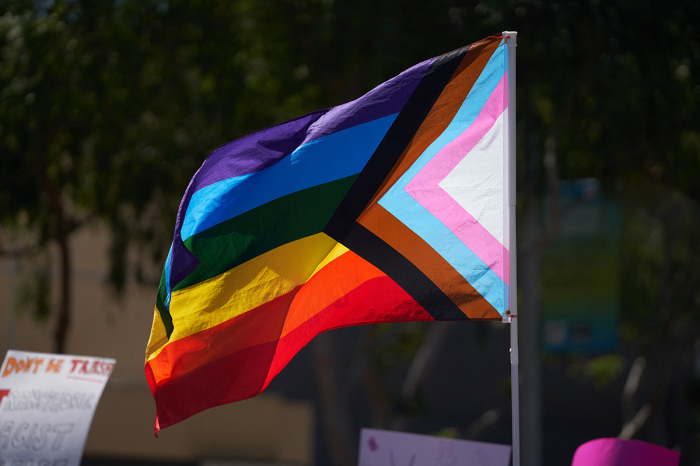
Lewisham Council in London, England, has removed a Progress Pride flag from its headquarters following allegations of political bias and a threat of a High Court injunction.
The complaint was lodged by Christian political candidate Maureen Martin, who accused the council of violating the Local Government Act by displaying the flag during an election period.
Martin, representing the Christian Peoples’ Alliance in Lewisham East, initiated legal action through her lawyers, who warned the council that they would seek injunctive relief in the High Court unless the flags were taken down.
Christian Concern, whose legal arm, Christian Legal Centre, supported Martin’s lawyers, stated that the flag was displayed without planning permission at the council’s main office in Catford, South London. The flag incorporates elements representing LGBT and marginalized communities alongside the traditional six-color rainbow flag.
The Progress Pride flag’s design is deliberate, including colors like light blue, pink and white, which symbolize traditional gender identities as well as those transitioning or identifying as gender-neutral or intersex. However, unlike the standard pride flag, the Progress Pride flag requires special permissions to be displayed, a stipulation not met by Lewisham Council.
In their legal correspondence, Martin’s lawyers drew attention to the contentious nature of transgender rights in the United Kingdom, stressing that non-binary identities, promoted by the Progress Pride flag, are not recognized or protected under U.K. law as per the highest court rulings.
They referred to the Local Government Act 1986, which prohibits local authorities from publishing material that seems designed to support a political party.
According to the lawyers, by flying the flag, the council was perceived to be endorsing political parties advocating for expanded rights for trans-identified individuals and related identities during an election period. They demanded that the council not only remove the flags but also ensure they are not displayed during future election periods and refrain from supporting the ideological causes represented by the flag.
In response to the legal challenge, a council representative stated that the flag had been taken down. However, according to Christian Concern, other local authorities in places like Reading and Bournemouth continue to display the Progress Pride flag without the necessary permissions.
Martin criticized the widespread display of the Progress Pride flag, particularly during the month of June, arguing that the underlying ideology has negatively impacted vulnerable children.
“Greater awareness must be urgently raised about what these flags stand for, and public authorities flying them must be brought to account,” Martin said.
In May, over 30,000 people signed a petition protesting plans to display Progress Pride within the jurisdiction of the Westminster City Council.
The petition was launched by Christian Concern ahead of the display planned for LGBT pride month in June, when it is typical for shops, train stations and other public spaces to be decked out in pride flags every year.
In March, the government published a new definition of extremism, which included “the promotion or advancement of an ideology based on violence, hatred or intolerance, that aims to” among other things “negate or destroy the fundamental rights and freedoms of others.”
Christian Concern feared at the time that Christians who are pro-life, gender-critical or have traditionalist beliefs about marriage might fall foul of the new definition.
CLC’s Chief Executive Andrea Williams described the flags as “intimidating” and “exclusionary” towards Christians and others who oppose the pride ideology. “These flags shouldn’t be dominating our town centers and neighborhoods,” she said.
Last year, Martin received a significant payout after her dismissal by the housing association L&Q, where she had campaigned that marriage should be defined as a union between a man and a woman.








